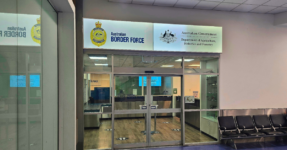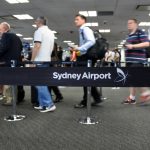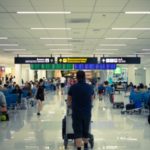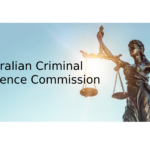Crime, Corruption and Coercion Rife Within the Australian Border Force

Lieutenant General Gavan Reynolds, the first defence intelligence chief, was appointed as the Australian Border Force Commissioner yesterday.
The Order of Australia member brings a wealth of experience to his new role as the Australian Border Force Commissioner. His previous roles as a military representative, Defence Intelligence Group chief, and Afghanistan War veteran, coupled with his Order of Australia membership, instil confidence in his ability to lead the Border Force — or at least that’s what the illusion is.
Has the Australian Border Force successfully facilitated the safe and legal passage of people and goods into the country, or has it lost its way over the years? Focusing on a mission to allow ‘genuine people and goods to enter and exit freely,’ the Border Force has the right idea in mind.
However, there have been numerous concerns regarding biosecurity risks, human trafficking, illegal substance trades, and corrupt immigration officials that have potentially tarnished the reputation of this ever-important aspect of Australia’s national security.
Border Force: Do Border Officials Have Too Much Power?
The Australian Border Force (ABF) was created in 2022 following the Australian Border Force Act, creating a merger between the Department of Immigration and Customs to facilitate a more comprehensive approach to protecting the borders. Unlike other members of the immigration department, ABF officers can detain individuals, carry firearms, and do whatever is necessary as long as it is related to their duties — providing them with an almost groundless level of rights.
For example, Sections 10 and 25 of the Act give an ABF official the right to ask a suspect to present to the officer a personal identifier referring to their identity. Along with the right of ABF officials to carry out visa checks, their power is furthered by the lack of restrictions laid out in the Migration Act 1958. This lack of oversight can lead to unchecked use of power, raising concerns about the potential misuse of their authority.
It is crucial that more work is done to ensure that the controls on Border Force officers’ powers are adequate. The current enterprise risk management framework does not sufficiently address the issue of officers unlawfully using their coercive powers. Instances of unlawful searches and failures to comply with the Customs Act and Migration Act, as found by the Australian National Audit Office, highlight the urgent need for more oversight.
Australian Border Force Act 2015
The Australian Border Force Act 2015 entered into force in 2020, citing that professionals in detention centres could be liable for a prison sentence for using their public rights to speak out about human rights violations.
Section 26 of the Act states that workers within detention centres are not allowed to disclose ‘protected information’, which can result in a maximum of two years imprisonment. However, this is a clear violation of freedom of speech in Australia that made citizens question whether the Border Force actually had the public’s best interests at heart—or if they were only trying to keep individuals quiet about potential government shortcomings.
Although the former Commissioner, Quaedvlieg, stated that the law would not be relevant to detention centre workers, previous accounts of people being punished for exposing government corruption have happened in the past. In 2019, staff members of ‘Save the Children’ were charged with exposing sub-human detention centre conditions under section 70 of the Crimes Act 1914 Commonwealth.
As you can see, trying to ‘hush’ individuals who are exposing human rights violations is a huge issue against freedom of speech in Australia.
Corruption in the Border Force
Corruption is one of the major issues within the Australian government and immigration department as a whole. The Border Force personnel are especially susceptible to corruption in the form of bribes, misleading information, misleading evidence, and abuse of power.
Just earlier this year, Roman Quaedvlieg was found guilty of acting corruptly while serving as the Commissioner of the Australian Border Force. The Australian Commission for Law Enforcement Integrity filed eight allegations of corruption against the former ACT chief, leading to the firing of the once-lauded official.
In addition, an ABF officer and former Customs officer were charged in their role in an international criminal ring to import drugs and tobacco into the country in 2017. Members were part of a plan to import more than 200 kilograms of illegal drugs and 50 million cigarettes into Australia via sea cargo ship.
Crime Around the Border
The Australian Border Force is tasked with monitoring the coastline, international airports, seaports, ships, and mail for illegal activities, such as the following:
Tobacco Importation
One of the main concerns for the ABF is the high number of attempted tobacco imports, with most of the shipments arriving from Asia and the Middle East. Since Australia has one of the highest tobacco taxes, illegal tobacco is extremely popular with criminal networks. Since 1 July 2024, the ABF has refused immigration to 24 passengers with an estimated duty of more than $1 million through Australian airports.
Human Trafficking
Another common crime that the Border Force must identify is the illegal movement of people across borders, including human trafficking and child exploitation. The AFP must work together with the Department of Foreign Affairs and Trade, the Department of Home Affairs, the Attorney General, and the ABF to collaborate and investigate current human trafficking cases, provide education to communities, and support victims.
Possession/Importation of Firearms
The ABF must also monitor the potential importation and possession of illegal firearms into Australia, with the widespread weapons trafficking business linked to drug trafficking rings, crime rings, motorcycle gangs, and terrorist organisations.
The National Firearm Trafficking Policy Agreement (2002) created stricter rules regarding the illegal trade of firearms in Australia by increasing border protection and establishing new offences related to the unlawful possession of firearms.
Money Laundering
Lastly, the Border Force deals with money laundering and organised crime rings within Australia. Money laundering is typically facilitated by money laundering organisations, enablers, organised crime groups, or criminal clients.
The Border Force has created Taskforce Avarus to identify and stop organised criminals attempting to launder money through the country’s property market and economy.
Public Perception of the Border Force – A Sinking Ship
Despite the critical role the Border Force plays in the country’s safety and security, its public perception is fair at best. The potential human rights violations, sexism in the ABF units, public speech impingements, and rampant corruption have significantly tarnished its reputation, leading to public scepticism.
Five years ago, documents from the Defence Department were leaked, highlighting its inability to meet the sea patrol targets. The lack of proficiency in this organisation brought to light a more significant issue: the Department of Home Affairs directly employs ABF officers. Thus, the ABF workforce is controlled by the secretary of Home Affairs.
The ABF does not have an independent intelligence staff or financial rights, meaning it is directly swayed and puppeteered by the Department of Home Affairs. Not only does the ABF fall short on many issues, but it needs to be more accountable for managing budgets, staffing, and failing to meet targets.
Know Your Rights
If you are under investigation by federal authorities such as the Australian Border Force or charged with a Commonwealth criminal offence, call the experienced criminal defence team at Sydney Criminal Lawyers® for expert advice and formidable legal representation.






